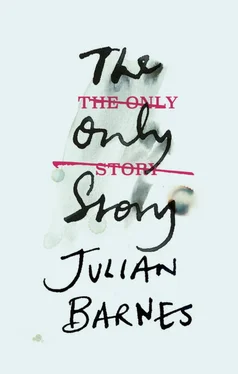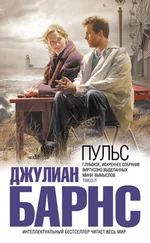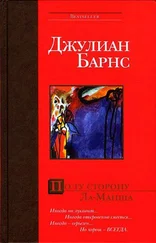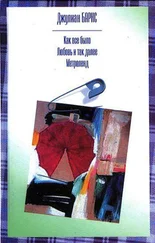You hear reports. Some people are shy about mentioning things to you, others not. A friend, on a bus a mile or so away from Henry Road, has spotted her down an alleyway next to an off-licence, raising a newly bought bottle to her lips. This image burns deep, and transforms itself from another’s account into your own private memory. A neighbour tells you that your auntie was in the Cap and Bells last Saturday night, downing five sherries in succession until they stopped serving her. ‘It’s not the kind of pub someone like her should be in,’ the neighbour adds concernedly. ‘They get all sorts in there.’ You picture the scene, from her ashamed first order at the bar to her unsteady walk home, and this too becomes part of your memory bank.
You tell her that her behaviour is destroying your love for her. You do not mention hers for you.
‘Then you must leave me,’ she says. She is flushed, dignified and logical.
You know that you are not going to do this. The question is, whether or not she knows it too.
You write her a letter. If spoken words of rebuke fly unhindered straight out of her head, perhaps written ones will stick. You tell her that the way she is going on, she will almost certainly die of a wet brain, that there is nothing more you can do for her, except come to her funeral, whenever that might be. You leave the letter on the kitchen table, in an envelope with her name on it. She never mentions receiving it, opening it, reading it. With your inky pen to make you hate me .
You realize that tough love is also tough on the lover.
You are taking her to Gatwick. Martha has invited her out to Brussels, where she is working as a Eurocrat. To your surprise, Susan agrees. You promise to make it as easy as possible for her. You will drive her to the airport and see her through check-in. She nods, then says straightforwardly,
‘You might have to let me have a drink before getting on the plane. Belgian courage.’
You are more than relieved: almost encouraged.
The night before she is half-packed and half-drunk. You go to bed. She continues packing and drinking. The next morning she comes to you with a cupped hand over her mouth.
‘I’m afraid I don’t think I shall be able to go.’
You look at her without speaking.
‘I’ve lost my teeth. I can’t find them anywhere. I think I may have thrown them into the garden.’
You don’t say anything except, ‘We have to leave by two.’ You decide to let her go on destroying her life.
But perhaps your failure to respond – to offer neither help nor rebuke – is, for once, the correct approach. An hour or two later, she is walking around with her teeth in, never alluding to either having lost them, or found them.
At two o’clock you put her case in the back of the car, double-check her ticket and passport and set off. There have been no last-minute diversions, no scurrying for a bright yellow laundry bag. She sits beside you quiet as a mouse, in the railway policeman’s words.
As you are approaching Redhill, she turns and says in a demurely puzzled way, as if you were more her chauffeur than her lover,
‘Would you mind very much telling me where we are going?’
‘You’re going to Brussels. To visit Martha.’
‘Oh, I don’t think so. There must be some mistake.’
‘That’s why you’ve got your ticket and your passport in your handbag.’ Though they are actually in your pocket, as you don’t want them going the way of her teeth.
‘But I don’t know where she lives.’
‘She’s meeting you at the airport.’
There is a pause.
‘Yes,’ she says, nodding, ‘I seem to remember about this now.’
There is no further resistance. Part of you thinks she should have a large label round her neck with her name and destination written on it, like a wartime refugee. With perhaps her gas mask in a box as well.
At the bar you buy her a double schooner of sherry, which she sips with inattentive gentility. You think: it could be worse. This is how you react to situations nowadays. You have the lowest of expectations.
The trip turns out to be a success. She has been shown the city, and brings you some postcards. Miss Grumpy, she announces, is nowadays Much Less So, perhaps influenced by a charming Belgian boyfriend who was in attendance. Her memories are clearer than usual, a sign that she has been temperate. You feel happy for her, if slightly resentful that she can clean up her act for others more easily than for you. Or so it seems.
But then, she tells you that on the last morning, the real reason why her daughter invited her out became clear. She, Miss Grumpy, is of the opinion that her mother ought to go back to Mr Gordon Macleod. Who is now very contrite and promises to be on his best behaviour if she returns. According to Susan, according to her daughter.
To save time, and to save emotion, you address her, straightforwardly, as a drinker. No longer, There seems to be a problem, Do you know what it might be, Perhaps I can suggest… none of that. So one day you suggest Alcoholics Anonymous, not knowing if there is a branch near you.
‘Not going to the God-botherers,’ she replies firmly.
Given her dislike of priests, and extreme disapproval of missionaries, this response is understandable. No doubt she thinks of AA as yet another bunch of American missionaries interfering in other countries’ belief systems, bringing the foreign halt and lame into the radiant presence of their God. You do not blame her.
Mostly, you can only deal with the day-to-day crises. Occasionally, you look to the future, and find one outcome which has a terrifying logic. It goes like this. She doesn’t drink all the time. Not every day. She can go a day or two without the comfort of a bottle. But her memory, as a result of the drink, is getting poorer. So the logic runs: if she carries on destroying her memory at the present rate, maybe she will reach the stage when she has actually forgotten she is an alcoholic! Might that happen? It would be one way to cure her. But you also think: you might as well simply blast her with ECT and be done with it.
Here is one of the problems. You don’t, at bottom, think of alcoholism as a physical disease. You might have heard that it is, but you aren’t really convinced. You can’t help thinking of it as many people – some of whom you might not want to be associated with – have thought about it for centuries: as a moral disease. And one of the reasons you do so is because she does too. When she is at her most lucid, her most rational, her most gentle, and as much tormented by what is happening to her as you are, she tells you – as she always has – that she hates the fact that she is a drinker, and feels deep shame and guilt about it: so you must leave her, because she is ‘no good’. She has a moral disease, which is why hospitals and doctors cannot cure her. They cannot fix a flawed personality from a played-out generation. She urges you again to leave her.
But you cannot leave Susan. How could you bear to withdraw your love from her? If you didn’t love her, who would? And maybe it is worse than this. It is not just that you love her, but that you are addicted to her. How ironic would that be?
An image comes into your head one day, an image of your relationship to one another. You are at an upstairs window of the house on Henry Road. She has somehow climbed out, and you are hanging on to her. By the wrists, of course. And her weight makes it impossible for you to pull her back inside. It is all you can do to stop yourself being pulled out with her, by her. At one point she opens her mouth to scream, but no sound emerges. Instead, her dental plate comes loose; you hear it hit the ground with a plasticky clatter. You are stuck there, the two of you, locked together, and will remain so until your strength gives out, and she falls.
Читать дальше








